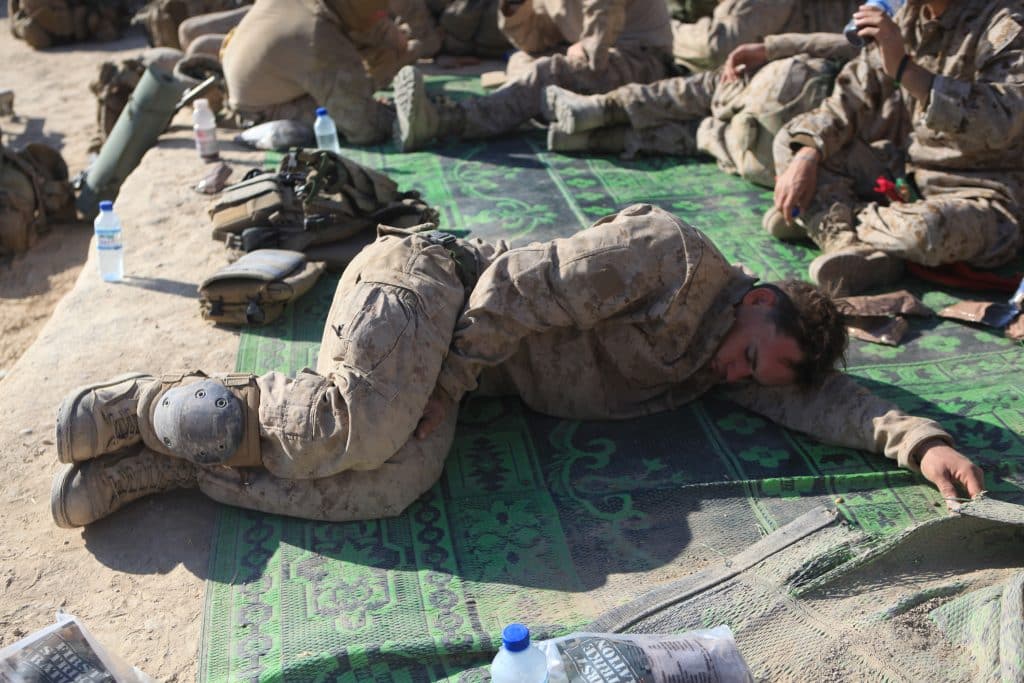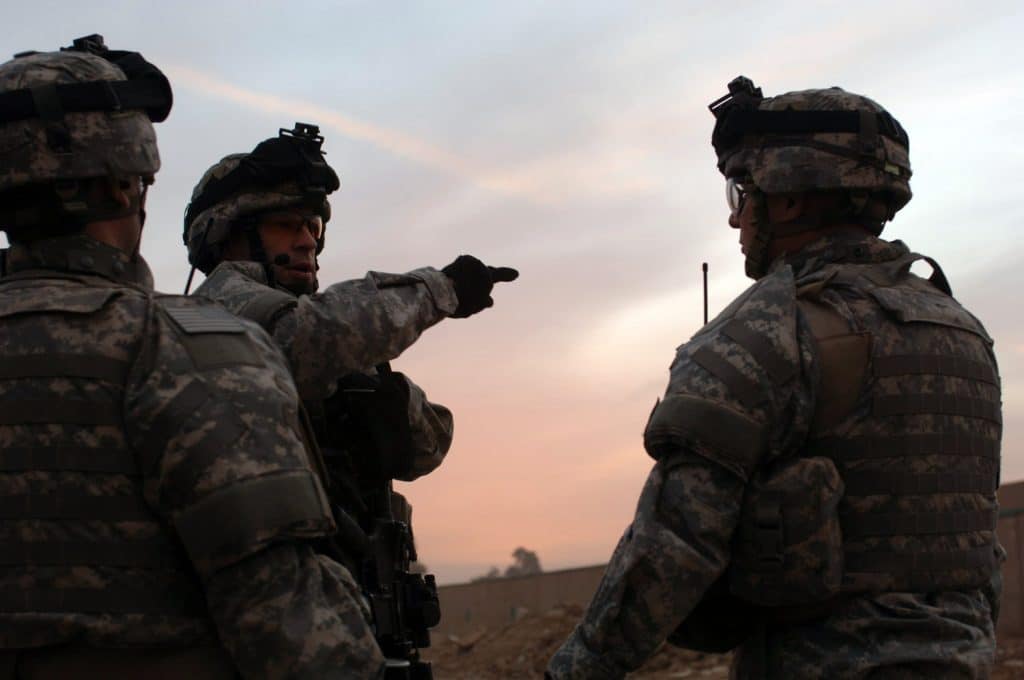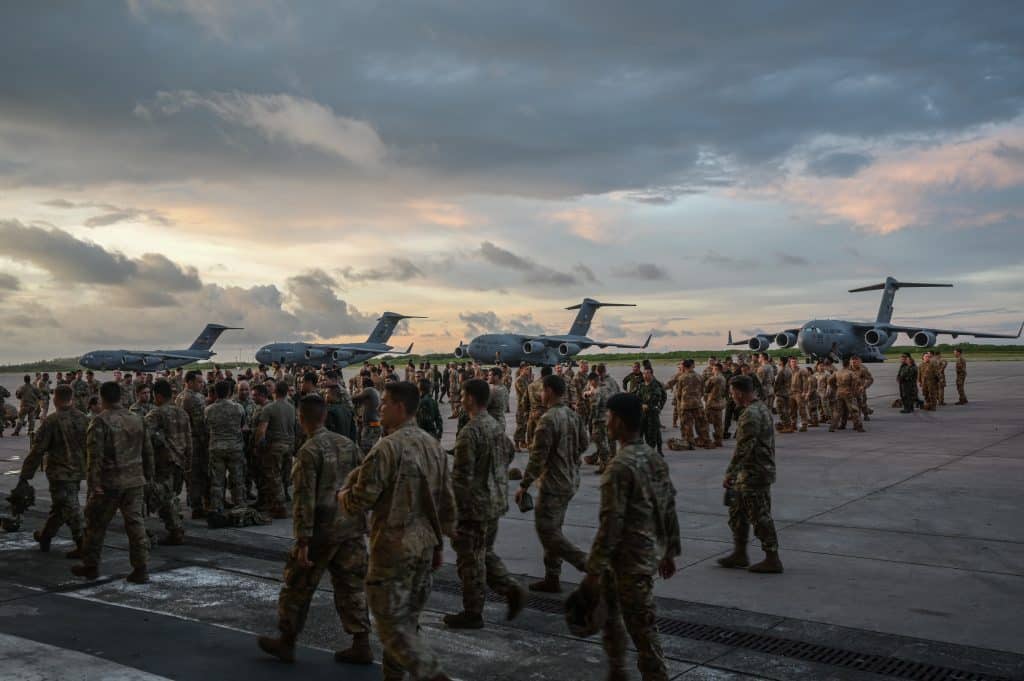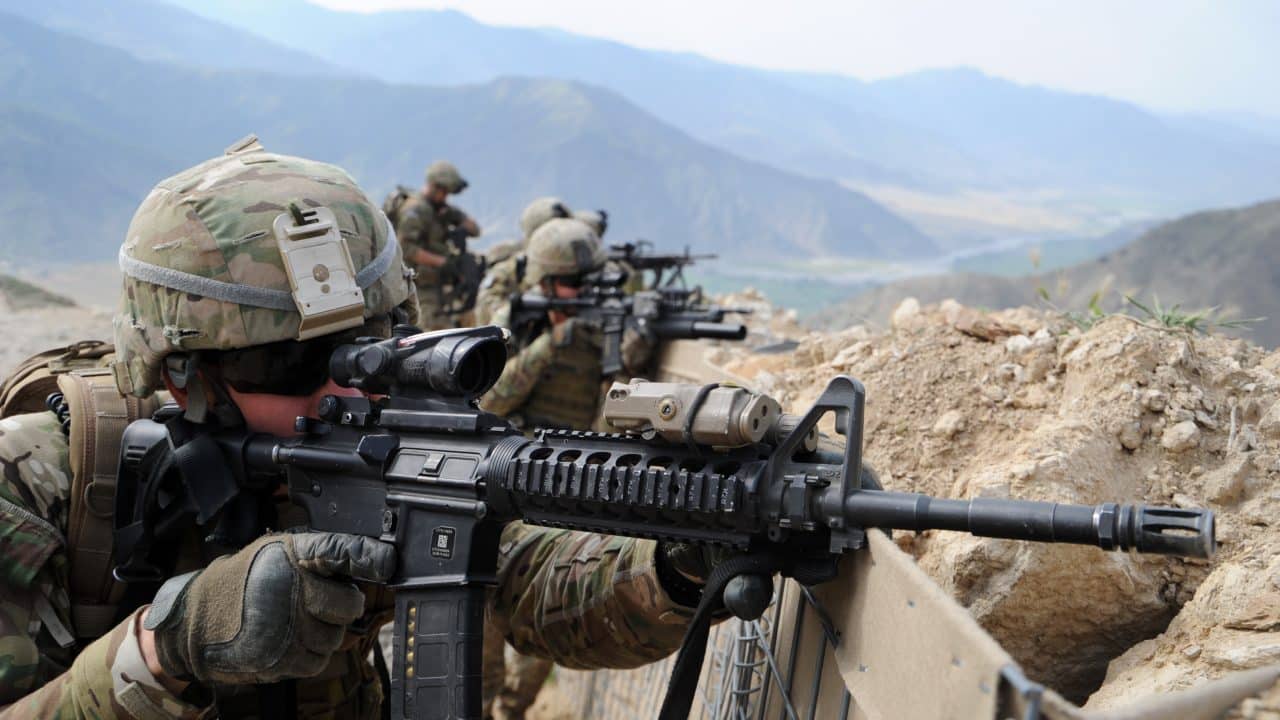by MSG Michael E. Bogle Jr, US Army
Leaders must lead and not be afraid to act or make mistakes. Leaders must be more agile in the era of Irregular warfare. Irregular warfare is a violent struggle by non-state actors against state actors (Joint Chiefs of Staff, 2020). Irregular warfare on the side of non-state actors has no rules, blending in with the population and using unconventional tactics. Because of this, leaders must provide training and guidance and use all resources available to empower today’s Soldiers. Leaders must also use these programs themselves. Leaders must set the example for Soldiers to follow. Irregular warfare attempts to cause chaos and confusion. Leaders must build trust, set an example, be relevant, and train the Soldiers to one day be the leader they want to be led by. This article discusses the importance of the Performance TRIAD, mission command principles, and leadership presence in irregular warfare.
Using Performance TRIAD to Battle Irregular Warfare
Performance TRIAD is particularly important during irregular warfare. Irregular warfare can be taxing on today’s Soldiers. Department of Defense (DOD, 2010) elaborates on irregular warfare as “Adaptive adversaries such as terrorists, insurgents, and criminal networks, as well as states, will increasingly resort to irregular forms of warfare as effective ways to challenge conventional military powers” (p. 4). An irregular warfare tactic example is a terrorist using a roadside bomb to destroy military convoys. Non-state actors using irregular warfare to their advantage by blending into the civilian population can be hard to detect, causing stress. Soldiers must stay alert and vigilant to battle irregular warfare. Leaders implementing and enforcing the Performance TRIAD is critical to any war or battle. The Performance TRIAD has three sections, sleep, activity, and nutrition (Department of the Army [DA], 2016).
Sleep
Sleep is essential to all human beings, especially Soldiers, during combat. According to DA (2016), sleep is instrumental to physical and psychological health. It also explains that seven to eight hours of sleep is the ideal amount of sleep a Soldier needs to stay aware and keep the mental edge. In combat, seven hours of sleep might be difficult to achieve every day. Leaders must ensure that Soldiers are getting rest when available and always have work rest priorities for every mission. Sleep-deprived Soldiers can make mistakes that cost lives and could be detrimental to the mission. Dozing off behind the wheel or in the gunner’s hatch can cause Soldiers to miss spotting the roadside bomb planted by a tersest. Without adequate sleep, a Soldier will have issues performing physical activity.

Activity
Physical activity is a big part of being a Soldier. Activity under the Performance TRIAD is functional fitness that helps prevent injury, and activity is vital to physical readiness and performance (DA, 2016). The activity part also stresses that movement throughout the day is needed to support health and that gym sessions or fitness time in the gym are not enough. Activity helps prevent fatigue, and sleep helps the body reenergize to avoid fatigue. Leaders implementing physical readiness training and pushing Soldiers and their units to excel at the Army Combat Fitness Test is one way to prepare for warfare and using the performance TRIAD (Smith, 2019). The challenging circumstances in irregular warfare will push Soldiers to their limits. To prevent fatigue and failure, they must train and perform at their best; to do this, they will need good nutrition habits.
Nutrition
Nutrition is one of the most critical aspects of the Performance TRIAD. The food you put into your body affects your mood and physical performance (DA, 2016). It also elaborates that eating correctly and physical performance will help increase energy, endurance, focus, and motivation and help shorten recovery time. Getting the proper nutrients for your activity level and body type is vital. Hydration is another aspect of nutrition that is especially important. Correct water intake is crucial to performance and avoiding heat injuries. Hydrate correctly by drinking water and avoiding energy drinks and any liquid high in calories and sugars. Leaders can have dieticians come and give their Soldiers classes to increase their knowledge of proper nutrition and how to implement the Performance TRIAD into their routine.
Performance TRIAD as a Whole
Leaders must use all aspects of the Performance TRIAD to have maximum effect and build warriors. A Soldier must sleep, conduct physical activity, and eat in a collective plan to increase performance. If one aspect of the TRIAD is lacking, it can affect the Soldier mentally, physically, or emotionally. For example, a Soldier who sleeps correctly and exercises regularly can still be weak or fatigued if not eating and hydrating correctly. This goes for any step in the TRIAD. You must adhere to all three to be the most effective when conducting missions. The TRIAD is vital to staying alert against enemies that are using irregular warfare. Leaders can influence activity; however, eating and sleeping are harder to manage. Leaders must trust that the Soldiers will eat and sleep correctly when not supervised. This takes competence, mutual trust, and a shared understanding of what must be done. Mission command and its principles apply to the TRIAD and irregular warfare.
Mission Command Principles Vital for Irregular Warfare
Mission Command and its principles are vital to successfully facing irregular warfare. According to Army Doctrine Publications (ADP) 6-0, Mission Command is “The Army’s approach to command and control that empowers subordinate decision making and decentralized execution appropriate to the situation” (DA, 2019a, p. 13). ADP elaborates that Mission Command has seven principles that fall into three categories as part of the leader’s responsibility. The three categories are: build, communicate, and empower. Empower has the principles of disciplined initiative and risk acceptance. Empowering leaders allows commanders to extend their reach across the operational environment, and disciplined initiative will enable leaders to make decisions when necessary.

Exercise Disciplined Initiative
Exercise discipline initiative is significant during irregular warfare. According to ADP 6-0, anything can go wrong, and sometimes there are no existing orders for a situation that might happen, and leaders must act (DA, 2019a). The ADP states that leaders will act and make the best decision to carry out the mission while using the commander’s intent. For example, if the commander intends to get fuel to Alpha company, then that must happen. As the convoy heads to Alpha Company, a roadside bomb destroys the road, disrupting all communications. The leader uses their best judgment to find another route and gets the fuel to Alpha company. The leader will report to the commander as soon as they can. The commander has trust that the leaders will make the right decisions in keeping with the commander’s intent. The commander relies on the Sergeant Major and other Noncommissioned Officers to train leaders to act without orders. According to DA (2016), planning and training can make these situations easier to cope with. Anytime discipline initiative is used, there is a risk. Commanders can reduce risk with training and planning.
Risk Acceptance
With any warfare, especially irregular warfare, there will be risks that the commander, leaders, and Soldiers will meet. According to ADP 6-0, risk acceptance is how much risk the commander is willing to accept (DA, 2019a). The ADP also says that mitigating risk is necessary where possible. The commander must plan and prepare to foresee risks—knowing that irregular warfare is unfair and the people using irregular warfare will exploit their weakness against the forces. For example, attacking a convoy from a mosque or firing upon Soldiers from a crowd of incent people. These are risks not to take due to the impact on the population and religious structure. According to DA (2017a), the commander “must identify methods to mitigate risks during events/activities while still accomplishing desired end state for the unit” (p. 25). Leadership presence during missions and situations that arise during irregular warfare will make risk acceptance more manageable with discipline initiative and mutual trust from the commander to the leader on the ground.
Leadership Presence During Irregular Warfare
Presence is a leadership attribute described by DA (2019b) as part of the Army Leadership Requirements Model and is the military bearing, fitness, confidence, and resilience of a Soldier and leader. It also says that the commander or leader must be present to understand and visualize the operational environment fully. This allows them to express their commander’s intent and adjust the plan and missions as needed. DA (2017b) defines presence as “The impression a leader makes to others contributes to success in leadership and is the sum of their outward appearance, demeanor, actions, and words” (p. 8). Just being there is not enough. As a leader, you must set the example, and if what you need the Soldier to do is hard, dangerous, or sucks, then you should also be there. While you are there, you must be seen, heard, and relevant. Irregular warfare is violent and sometimes comes as a surprise attack. Having leaders right there allows them to inspire, motivate, and lead Soldiers. In irregular warfare, a leader must portray presence and be present to lead and set an example. Not setting the example or keeping bearing can quickly corrupt and destroy a unit.

Conclusion
The purpose of this paper is to discuss the importance of the Performance TRIAD, mission command principles, and leadership presence during irregular warfare. The performance TRIAD, which comprises sleep, activity, and nutrition, all play equal parts in a Soldier’s ability to be fit, make decisions, and perform during irregular warfare. The commander uses mission command to extend their reach, and some principles help guide the commander. Risk acceptance is crucial for the commander to show when risk is acceptable and when to adjust the plan to minimize risk and still reach the end state. The commander also uses the principal discipline initiative to empower their leaders to make decisions when dealing with unfamiliar situations like irregular warfare to complete their mission and reach the commander’s intent. A leader’s presence, which includes actions, bearing, and ability to lead Soldiers without wavier, is vital to any war. Combining the TRIAD to train and prepare warriors, using risk acceptance, discipline initiative, and leader’s presence all contribute to the success of a unit facing irregular warfare.
References
Department of Defense. (2010). Irregular warfare: Countering irregular threats (Version 2.0). https://www.jcs.mil/Portals/36/Documents/Doctrine/concepts/joc_iw_v2.pdf?ver=2017-12-28-162021-510
Department of the Army. (2016). Force health protection (ATP 4-02.8). https://armypubs.army.mil/epubs/DR_pubs/DR_a/ARN30124-ATP_4-02.8-001-WEB-3.pdf
Department of the Army. (2017a). Army training and leader development (Army Regulation 350-1).https://usacac.army.mil/sites/default/files/documents/cace/LREC/AR350-1_Web_FINAL.PDF
Department of the Army. (2017b). Army profession and leadership policy (Army regulation 600-100). https://armypubs.army.mil/epubs/DR_pubs/DR_a/pdf/web/ARN3758_AR_600-100_FINAL_WEB_.pdf
Department of the Army. (2019a). Mission command: Command and control of Army forces (ADP 6-0). https://armypubs.army.mil/epubs/DR_pubs/DR_a/ARN34403-ADP_6-0-000-WEB-3.pdf
Department of the Army. (2019b). Army leadership and the profession (ADP 6-22). https://armypubs.army.mil/epubs/DR_pubs/DR_a/ARN18529-ADP_6-22-000-WEB-1.pdf
Joint Chiefs of Staff. (2020). Joint warfighting (JP 1 V1) https://jdeis.js.mil/jdeis/new_pubs/jp1_vol1.pdf
Smith, S. (2019). Everything you need to know about the Army’s new pft. Military.com. https://www.military.com/military-fitness/army-fitness/army-fitness-requirements/everything-you-need-know-about-armys-new-pft

The views presented in this article are those of the author and do not necessarily represent the view of Department of Defense, Department of the Army, or their components.
Master Sergeant Michael E. Bogle Jr is a Culinary Advance Management Noncommissioned Officer. He has served in every position from Culinary Specialist to Enlisted Aide in his career field. He has also been a Forward Logistics Element (FLE) NCOIC and a First Sergeant for a Forward Support Company in a Cavalry Battalion. He has 22 years of military experience including working on the Sectary of the Army’s staff and working directly for three General Officers. He currently attends the Sergeants Major Course (Resident) Class 73 at the US Army Noncommissioned Officer Leadership Center of Excellence at Fort Bliss, Texas.
His civilian education includes an associate degree in Culinary and Hospitality Management from Central Texas College and, pending graduation from the Sergeants Major Course, will receive a bachelor’s degree in Leader and Workforce Development from the Army Command and General Staff College, after which he will pursue a Masters in history from Excelsior.
As the Voice of the Veteran Community, The Havok Journal seeks to publish a variety of perspectives on a number of sensitive subjects. Unless specifically noted otherwise, nothing we publish is an official point of view of The Havok Journal or any part of the U.S. government.
Buy Me A Coffee
The Havok Journal seeks to serve as a voice of the Veteran and First Responder communities through a focus on current affairs and articles of interest to the public in general, and the veteran community in particular. We strive to offer timely, current, and informative content, with the occasional piece focused on entertainment. We are continually expanding and striving to improve the readers’ experience.
© 2024 The Havok Journal
The Havok Journal welcomes re-posting of our original content as long as it is done in compliance with our Terms of Use.



